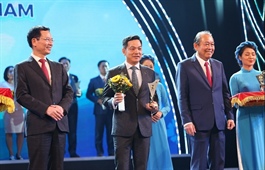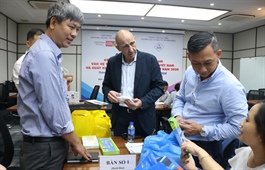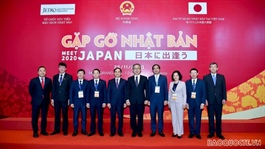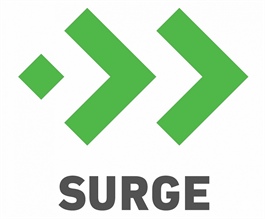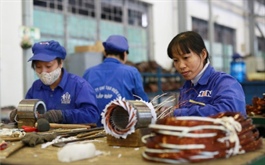How the best companies in Vietnam grew during COVID?
How the best companies in Vietnam grew during COVID?
Whilst many companies struggled during the pandemic, a few turned the situation to their advantage. In fact, they did so spectacularly well and are now calling the crisis their “golden time” or “lucky moment”!
As a judge of the Vietnam Human Resources Awards, last week, I heard some of the top companies in Vietnam present their winning formulas. I am happy to say there was a consistent pattern of how they all achieved increased market shares during challenging times. This is something many will be concerned about, so these companies’ experiences provide a useful indicator of what others could aim for.

Colin Blackwell facilitated an insightful dialogue with Eric Yeo (managing director of Amazon Web Services Vietnam) at Vietnam HR Awards Gala on November 25
|
The first characteristic was that all of the successful companies had achieved a decent level of digital transformation in 2019 already. This had usually been accompanied by a broader modernisation, where they had taken on "agile" organisational structures. These modern companies are very well suited to dealing with 2020, whilst old-fashioned companies are paying a heavy price now for leaving change too late.
A few years ago, transformation was sounding interesting but was not yet mainstream, mainly being discussed in the specialist circles of technology companies, or in some of the World Bank position papers I was contributing to. Many companies were rightly wondering if the whole thing was empty buzzwords. But then a couple of years ago business software seemed to cross a magic boundary making significant change practical. The best companies jumped to the chance, automating processes and embracing online business opportunities.

Colin Blackwell announced and presented the trophy to one of the winning companies in Vietnam HR Awards 2020
|
When the pandemic started, there was a stark choice for all businesses. Either they could adapt processes or they had to stop. Those that were digital could switch to online remote working and find alternatives to supply chain disruptions. Vitally, their foundation in e-commerce allowed them to scale up those channels fast and even increase sales whilst their old fashioned competitors stumbled. Their bravery and foresight was being rewarded.
Seeing the early advantages of their transformation, the best companies then seriously sped up their modernisation, using the urgency of the situation to remove any hesitation. Many projects that would normally have taken months – such as launching new software, moving sales to new online channels, or refitting manufacturing lines – were achieved literally in days. Now those companies know what they are capable of, they will now be set at that “new normal” fast speed and will pull ever further ahead of their competitors.
| Yes Vietnamese companies were at a massive advantage thanks to the government’s success in containing the pandemic. But also the best Vietnamese companies and people shone with their exceptional abilities during the crisis. |
The old fashioned companies with strict inflexible hierarchies and staff saying “tell me what to do” are probably still nervously waiting for things to get back to the old normal. The modern agile companies on the other hand wasted no time and were able to spring into action in March already. Their organisational structures could be realigned fast, with everyone empowered to help with creative solutions. Nobody has ever dealt with a pandemic like this before, so being creative became the most valued skill.
The human resources (HR) function found itself in an interesting new role. As the pandemic affects people, then the employees became even more critical to commercial success than ever. The commercial, operational, and strategic futures of companies were dependent on people being able to adjust, so HR directors were asked to step up to deal with those issues.
The best HR directors did not hesitate, or even stop to ask if their new responsibilities were even “human resources” at all any longer. All they knew was it involved people and it needed doing. The role of HR in these top companies will never go back to the old ways, now that everyone knows that they are capable of significant positive commercial impact.
The type of employees companies need has also permanently changed in this “new normal”. There had been a shift towards “human” skills over many years due to automation. The pandemic turned this gradual shift into a sudden rush.
As a matter of survival, the new competencies are now essential, not just nice to have. Expect to see much more in the future of companies seeking empathy, creativity, lateral thinking, problem solving, and cognitive skills. People who have these abilities will thrive through these challenging times.
Vietnam was better able to achieve this than other countries, according to the companies at the Human Resources Awards. Yes, Vietnamese companies were at a massive advantage thanks to the government’s success in containing the pandemic. But also the best Vietnamese companies and people shone with their exceptional abilities during the crisis.
Staff were naturally more responsible about social distancing and management were naturally more adaptive than in most other countries. The result was Vietnam saw increased business with manufacturing, software coding, and outsourced services being relocated here. Whilst other countries hesitated or fumbled responses, Vietnam’s steadiness and creativity won. Much of that business will be here to stay, to Vietnam’s long-term advantage.
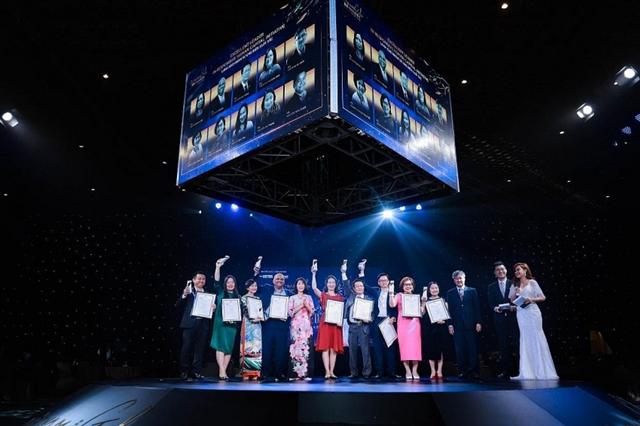
10 excellent HR leaders have been recognised and celebrated for responsive human capital initiatives during COVID-19
|
Every sector was impacted in different ways, with some facing more difficulties than others. But even in the most affected sectors the best companies managed to outperform. One of the important early messages they communicated to their staff was that their health and livelihoods were the most important things that would be protected. In return for committing to no job cuts, their employees rallied to give their best to turning around the situation as fast as possible. When they were asked to change their jobs significantly, go that extra mile, or become creative, they were more than willing to do so. HR was central to leading this cultural transformation within their companies.
Dealing with the crisis then became so much more than just carrying out a corporate emergency contingency plan. Transformation means completely changing away from old ways and finding something better. These modern methods have massive commercial impact in 2020. Some of the best companies even must be shyly thinking “thank COVID” for the success they have seen over the last few months.
But what about those companies that were not as well prepared or fortunate? Well, the good news is that it is not too late. Having seen the consistent patterns in those companies that have done well, my advice would simply be to copy them. Start your own transformation in both technology and organisational approach. It is easier than most people imagine, especially now the urgency is upon us. The best companies had many new slogans such as “courage to try” and “have no fear”. Once we set our minds to modernisation, we see quick results and then there is no retreat to the old ways.
This modernisation does not need to be expensive or painful. Changing your own attitude is for free. Persuading others to do the same is as good as free. The new technologies are now 10 times faster and cheaper than they were a couple of years ago. The first step is to see what is possible from those who actually succeeded, then embrace the same change that they did. With this approach, people, companies and countries can move forward. Vietnam is leading that progress and there is nothing stopping Vietnamese people and companies from doing the same – they are more than capable of it!







